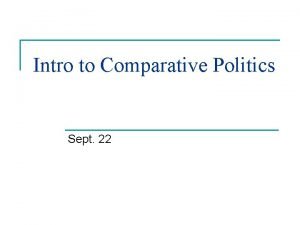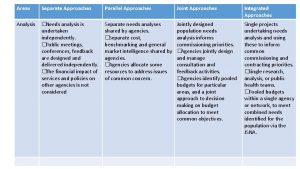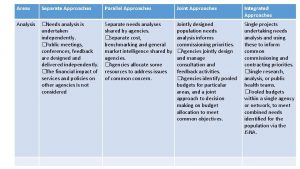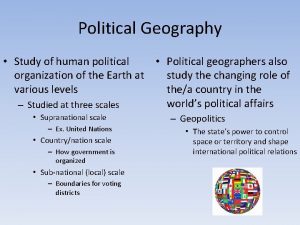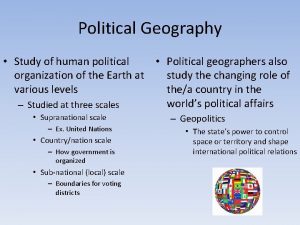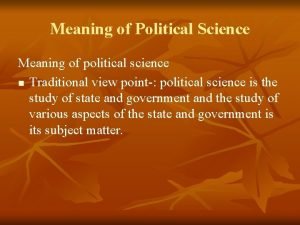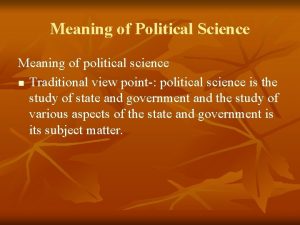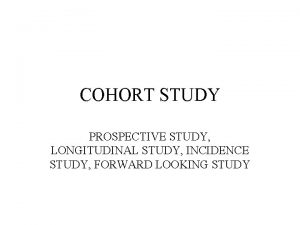Approaches to study Political science Political Science The













- Slides: 13

Approaches to study Political science

Political Science • The Art to run a stae is known as Politics. (Leacock) • The systematic way to study state and power is called political science

Branches of Political Science • Sociology • Economics • Anthropology • Psychology (These Branches are related with the behaviour of a person towards his vision and the culture of his region. )

Two Approaches to study Political Science • Traditional Approaches • Modern Approaches

Traditional Approach 1. Traditional Approach: to political science were widely prevalent till the outbreak of second World war. These approaches were mainly related to the traditional view of politics which emphasize the study of the state and government. They are primarily concerned with the study of organisation and activities. • They are Normative • Emphasize study of different Political structures. • Made little attempt to relate theory and research. Sub-Approaches of Traditional Approaches • Philosophical • Historical • Institutional • Legal

Philosophical • The word Philosophy comes from the ancient Greek word ‘philosophia’ Philosophy is study of general problems, such as those connected with reality, existence knowledge, values , mind and language. This is concerned with establishment of an society with norms and values.

Historical approach • The historical approach believes political theory emerged as a result of socio-economic crisis and the impact they had on great thinkers. E. g. • Greece produced Aristotle and Plato • England 17 th century- Locke and Hobess

Institutional Approach • Came into being in 19 th century due to reaction to legal and historical approaches. • Concentrate on executive, the legislature and judiciary too. • Deals with formal aspects of government and politics.

Legal Approach • Origin traced back to 19 th century. • Focus of study is law and legal system.

2. Modern Approaches • Advocated to minimise deficiencies of traditional approaches. • Regarded as reaction to traditional approaches. • Draw conclusions from empirical data. • Believe in interdisciplinary study of political science. • They rely on scientific methods.

Sub-Approaches of Modern Approaches. • Behaviouralism • Post-Behaviouralism

Behavioralism • David Easton first pointed out the intellectual foundations of behaviouralism. This approach believes that there are certain uniformities in political behaviour which can be expressed in generalisations or theories in order to explain and predict political phenomenon. In a particular situation the political behaviour of individuals may be more or less similar. Such regularities of behaviour may help the researcher to analyse a political situation as awell as to predict the future political phenomena.

Post-Behaviouralism • Post-Behaviouralism beleived that the use of scientific tools is beneficial if it can solve the various problems of the society. Behaviouralists gave too much emphasis on methods and techniques and believed that it was better to be vague than norelevantly precise. The post-behaviouralists criticised behaviouralism on the ground that the latter had lost ouch with the realities of the society because of over emphasis on techniques. Thus, post-behaviouralism may be regarded as the reform movement within behaviouralism. This new approach emphasises identifying and solving the major issues of political and social life. According to post-behaviouralism, the political scientists should find out different alternatives and means to solve the social problems. However, it must be remembered that it is only a continuation of behaviouralism. It does not altogether reject the ideas of behaviouralism. It acknowledges the achievement of behavoiuralism and appreciates its efforts to do objectives research in political science.
 When will the term of office begin for a national officer
When will the term of office begin for a national officer Approaches to the study of public administration
Approaches to the study of public administration Political comparative and superlative
Political comparative and superlative Misconceptions about linguistics
Misconceptions about linguistics What are your favorite subjects?
What are your favorite subjects? Hát kết hợp bộ gõ cơ thể
Hát kết hợp bộ gõ cơ thể Bổ thể
Bổ thể Tỉ lệ cơ thể trẻ em
Tỉ lệ cơ thể trẻ em Voi kéo gỗ như thế nào
Voi kéo gỗ như thế nào Tư thế worms-breton
Tư thế worms-breton Alleluia hat len nguoi oi
Alleluia hat len nguoi oi Các môn thể thao bắt đầu bằng tiếng bóng
Các môn thể thao bắt đầu bằng tiếng bóng Thế nào là hệ số cao nhất
Thế nào là hệ số cao nhất


